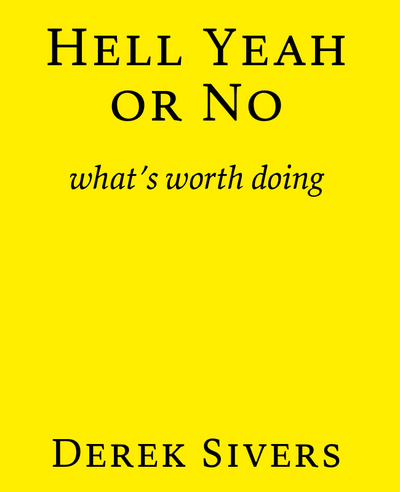
I’m not a big self-help book reader.
That said, there are times I come across something that could certainly be in that category that strikes a chord. Hell Yeah or No is one of those.
Derek Sivers is a multi-pronged American writer, entrepreneur, musician, world traveller, and increasingly, advice guru. Hell Yeah or No is the summary of a decade of his pondering over what’s worth doing and how to do it. His online writing about the topics helped enough people that he decided to distill the best of it into what became this book. It is, as he writes on the back cover, “A collection of thoughts about what’s worth doing, fixing faulty thinking, and making things happen.”
A couple of excerpts:
THINK LIKE A BRONZE MEDALIST, NOT SILVER
Imagine the Olympics, where you have the three winners of a race standing on the podium: the gold, the silver, and the bronze.
Imagine what it’s like to be the silver medalist. If you’d been just one second faster, you could have won the gold! Damn! So close! Damn damn damn! Full of envy, you’d keep comparing yourself to the gold winner.
Now imagine what it’s like to be the bronze medalist. If you’d been just one second slower, you wouldn’t have won anything! Awesome! You’d be thrilled that you’re officially an Olympic medalist and get to stand on the winner’s podium.
Comparing up versus comparing down: Your happiness depends on where you’re focusing.
PROCRASTINATION HACK: CHANGE “AND” TO “OR”
My unwritten condition for when to exercise was this: When it’s a nice day, and I’ve finished my work, and I haven’t just eaten, and I’m feeling energetic.
But of course that rarely happens, so I wasn’t exercising enough.
My coach suggested I change “and” to “or”.
When it’s a nice day, or I’ve finished my work, or I haven’t just eaten, or I’m feeling energetic.
Now I exercise quite often.
Do you have a list of conditions you need to have met before you do something?
Try changing “and” to “or.”
… what Sivers offers is nuggets of advice, broadly grouped into categories throughout the book, for how to look at situations from perspectives you may not have considered before in order to discover that what you’re doing for others can also be benefiting you, or to overcome your perceived problem, or to improve on something you feel is lacking, or to start what you’ve been putting off.
If easily digested bits of self-help/life coaching is your thing, you’d probably get a lot out of this book. It’ll be something that will sit on a book shelf and get referred to for years to come.